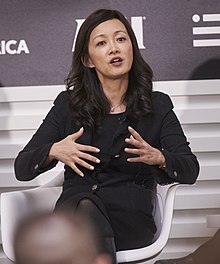Sue Mi Terry
Sue Mi Terry | |
|---|---|
 Sue Mi Terry speaking at a conference in 2018 | |
| Born | 1971 or 1972 (age 51–52)[1] Seoul, South Korea |
| Education | New York University |
| Alma mater | Tufts University |
| Occupation(s) | Writer, researcher |
| Employer | Center for Strategic and International Studies |
| Title | Senior Fellow |
| Korean name | |
| Hangul | 김수미[2] |
| Revised Romanization | Gim Sumi |
| McCune–Reischauer | Kim Sumi |
Sue Mi Terry (born c. 1972) is a former CIA officer, researcher, and senior fellow at the Council on Foreign Relations.[3] A former intelligence analyst specializing in East Asia, Terry is regularly quoted in print and web media as an expert on international politics involving North Korea, South Korea and Japan.
In 2021, she became director of the Hyundai Motor-Korea Foundation Center for Korean History and Public Policy at the Wilson Center, succeeding Jean H. Lee.[4]
Early life and education[edit]
Terry was born in Seoul. After her father's death due to liver cancer when she was in the fourth grade, she moved with her mother to the United States at age 12.[5][6] She was raised in Hawaii and Virginia.[7]
Terry received her B.A. in political science from New York University in 1993.[1][8] In 2001, she earned her Ph.D. in international relations from the Fletcher School of Law and Diplomacy at Tufts University.[9]
Career[edit]
She worked at the Central Intelligence Agency, the National Security Council, the National Intelligence Council and the Weatherhead East Asian Institute at Columbia University.[1][7] From 2001 to 2008, Terry was a senior analyst on Korean issues for the CIA, where she produced hundreds of intelligence assessments.[10] From 2008 to 2009, Terry was director of Korea, Japan and oceanic affairs in the National Security Council under Presidents George W. Bush and Barack Obama. In this capacity, she formulated, coordinated, and implemented U.S. government policy toward Korea and Japan as well as Australia, New Zealand, and Oceania.[11] She was a National Intelligence Fellow in the David Rockefeller Studies Program of the Council on Foreign Relations in New York from 2010 to 2011.[12] Since leaving the government, Terry served as a Senior Research Fellow at Columbia University's Weatherhead East Asian Institute from 2011 to 2015[13] and as Senior Advisor for Korea at Bower Group Asia from 2015 to 2017.[14] Terry has received numerous awards for her leadership and mission support, including the 2008 CIA Foreign Language Award.[8][15]
In 2017 she became a senior fellow for the Korea Chair at the Center for Strategic and International Studies.[8]
Terry has been cited as an expert on topics involving North Korea, such as the likelihood of North Korean defections during and after the Olympics,[16] whether US election results will affect relations with North Korea,[17] the probabilities for success of summit meetings between state leaders in the US and North Korea,[18] the impact of postponing or canceling joint military exercises,[19] the effects of United Nations actions regarding human rights in North Korea[20] and whether North Korea will attack South Korea.[21]
References[edit]
- ^ a b c "Korean American Lands Senior Fellowship at Influential Think Tank". The Chosun Ilbo. November 8, 2017. Retrieved October 10, 2018.
- ^ 박성균 (December 27, 2013). "정치력 신장 캠페인 본격 전개". Korea Daily. Retrieved October 12, 2018.
- ^ "CFR Welcomes Sue Mi Terry and Rush Doshi as Asia Fellows". Council on Foreign Relations. Retrieved April 9, 2024.
- ^ "Sue Mi Terry Appointed Director of the Hyundai Motor Korea Foundation Center | Wilson Center". www.wilsoncenter.org. Retrieved 2022-03-26.
- ^ "Dr. Sue Mi Terry, Columbia University" (PDF). US-China Economic and Security Review Commission. Retrieved October 10, 2018.
- ^ "美, 北 공격 여부 올해 결정할 수밖에 없을 것". Asia Business Daily. January 25, 2018. Retrieved October 12, 2018.
- ^ a b "Sue Mi Terry: Senior Fellow, Korea Chair". Center for Strategic and International Studies. Retrieved October 10, 2018.
- ^ a b c "Sue Mi Terry Joins CSIS as Senior Fellow for Korea Chair". Center for Strategic and International Studies. November 6, 2017. Retrieved October 10, 2018.
- ^ Terry, Sue Mi (2001). Park Chung Hee's Korea, 1961-1979: a study in political leadership and statecraft (PhD). Tufts University.
- ^ "Sue Mi Terry (F98, 01) | Tufts Global Leadership". tuftsgloballeadership.org. Retrieved 2022-09-15.
- ^ "Dr. Sue Mi Terry Columbia University" (PDF). U.S.-China Economic and Security Review Commission. Retrieved 2022-09-15.
- ^ "Sue Mi Terry | Wilson Center". www.wilsoncenter.org. Retrieved 2022-10-06.
- ^ "Sue Mi Terry is Managing Director at Bower Group Asia" (PDF). docs.house.gov. Retrieved 2022-10-25.
- ^ "Dr. Sue Mi Terry is Director of the Asia Program and Director of the Hyundai Motor-Korea Foundation Center" (PDF). docs.house.gov. Retrieved 2022-10-25.
- ^ "Dr. Sue Mi Terry Joins CSIS as Senior Fellow for Korea Chair". theseoultimes.com. 2017-11-06. Retrieved 2022-11-10.
- ^ Rich, Motoko (February 16, 2018). "Seeing Bounty Abroad, Will North Koreans Change Their Homeland?". The New York Times. Retrieved October 10, 2018.
- ^ Gramer, Robbie (October 8, 2018). "Will Republicans Lose Their Majority in Congress? Ask Pyongyang". Foreign Policy. Retrieved October 10, 2018.
- ^ Krawchenko, Katiana (June 1, 2018). "Former CIA analyst: U.S. must remain "very, very skeptical" of North Korea". CBS News. Retrieved October 10, 2018.
- ^ Johnson, Jesse (January 25, 2018). "In announcement to all Koreans, Pyongyang calls for unification and end to U.S. military exercises". The Japan Times. Retrieved October 10, 2018.
- ^ Gladstone, Rick (November 18, 2014). "United Nations Urges North Korea Prosecutions". The New York Times. Retrieved October 10, 2018.
- ^ Ackerman, Spencer (April 4, 2013). "Ex-CIA Analyst Expects North Korea to Attack South Korea Before Tensions End". Wired. Retrieved October 10, 2018.
No comments:
Post a Comment